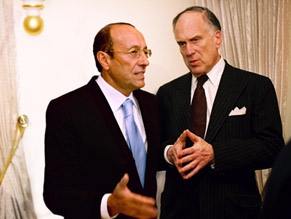|
Euroasian Jewish News

EAJC President Alexander Mashkevich and WJC President Ronald S. Lauder
|
EAJC President Comments WJC Leader Open Letter To USA President
15.04.2010
On the 15th of April, the leader of the World Jewish Congress (WJC) Ronald Lauder sent an open letter to the President of the United States Barack Obama on the current state of American-Israeli relations. The letter was published after a series of discussions with the leaders of high-profile Jewish organizations of the world, including the Euro-Asian Jewish Congress.
The WJC President's letter reads as follows:
"Dear President Obama:
I write today as a proud American and a proud Jew.Jews around the world are concerned today. We are concerned about the nuclear ambitions of an Iranian regime that brags about its genocidal intentions against Israel. We are concerned that the Jewish state is being isolated and delegitimized. Mr. President, we are concerned about the dramatic deterioration of diplomatic relations between the United States and Israel.
The Israeli housing bureaucracy made a poorly timed announcement and your Administration branded it an “insult.” This diplomatic faux pas was over the fourth stage of a seven stage planning permission process – a plan to build homes years from now in a Jewish area of Jerusalem that under any peace agreement would remain an integral part of Israel.
Our concern grows to alarm as we consider some disturbing questions. Why does the thrust of this Administration’s Middle East rhetoric seem to blame Israel for the lack of movement on peace talks? After all, it is the Palestinians, not Israel, who refuse to negotiate.
Israel has made unprecedented concessions. It has enacted the most far reaching West Bank settlement moratorium in Israeli history.
Israel has publicly declared support for a two-state solution. Conversely, many Palestinians continue their refusal to even acknowledge Israel’s right to exist.
The conflict’s root cause has always been the Palestinian refusal to accept Israel as the nation state of the Jewish people. Every American President who has tried to broker a peace agreement has collided with that Palestinian intransigence, sooner or later. Recall President Clinton’s anguish when his peace proposals were bluntly rejected by the Palestinians in 2000. Settlements were not the key issue then.
They are not the key issue now.
Another important question is this: what is the Administration’s position on Israel’s borders in any final status agreement? Ambiguity on this matter has provoked a wave of rumors and anxiety. Can it be true that America is no longer committed to a final status agreement that provides defensible borders for Israel? Is a new course being charted that would leave Israel with the indefensible borders that invited invasion prior to 1967?
There are significant moves from the Palestinian side to use those indefensible borders as the basis for a future unilateral declaration of independence. How would the United States respond to such a reckless course of action?
And what are America’s strategic ambitions in the broader Middle East? The Administration’s desire to improve relations with the Muslim world is well known. But is friction with Israel part of this new strategy? Is it assumed worsening relations with Israel can improve relations with Muslims? History is clear on the matter: appeasement does not work. It can achieve the opposite of what is intended.
And what about the most dangerous player in the region? Shouldn’t the United States remain focused on the single biggest threat that confronts the world today? That threat is a nuclear armed Iran. Israel is not only America’s closest ally in the Middle East, it is the one most committed to this Administration’s declared aim of ensuring Iran does not get nuclear weapons.
Mr. President, we embrace your sincerity in your quest to seek a lasting peace. But we urge you to take into consideration the concerns expressed above. Our great country and the tiny State of Israel have long shared the core values of freedom and democracy. It is a bond much treasured by the Jewish people. In that spirit I submit, most respectfully, that it is time to end our public feud with Israel and to confront the real challenges that we face together."
EAJC President Alexander Mashkevich, who participated actively in the discussion of the letter, commented the WJC position and underscored several important moments:
“First of all, the world Jewish diaspora showed its solidarity with the Jewish state, and reacted sharply to changes in the American government's Near East policy.
Second, despite their diverse approaches, the leaders of world Jewish structures managed to come to a consensus and work out a common measured position, as reflected in the published open letter.And finally, despite the serious concern displayed in the open letter, it should not be perceived as a sign of sudden tension or conflict in relationships neither between Israel and the USA, nor the world Jewish community and the American administration.”
|
